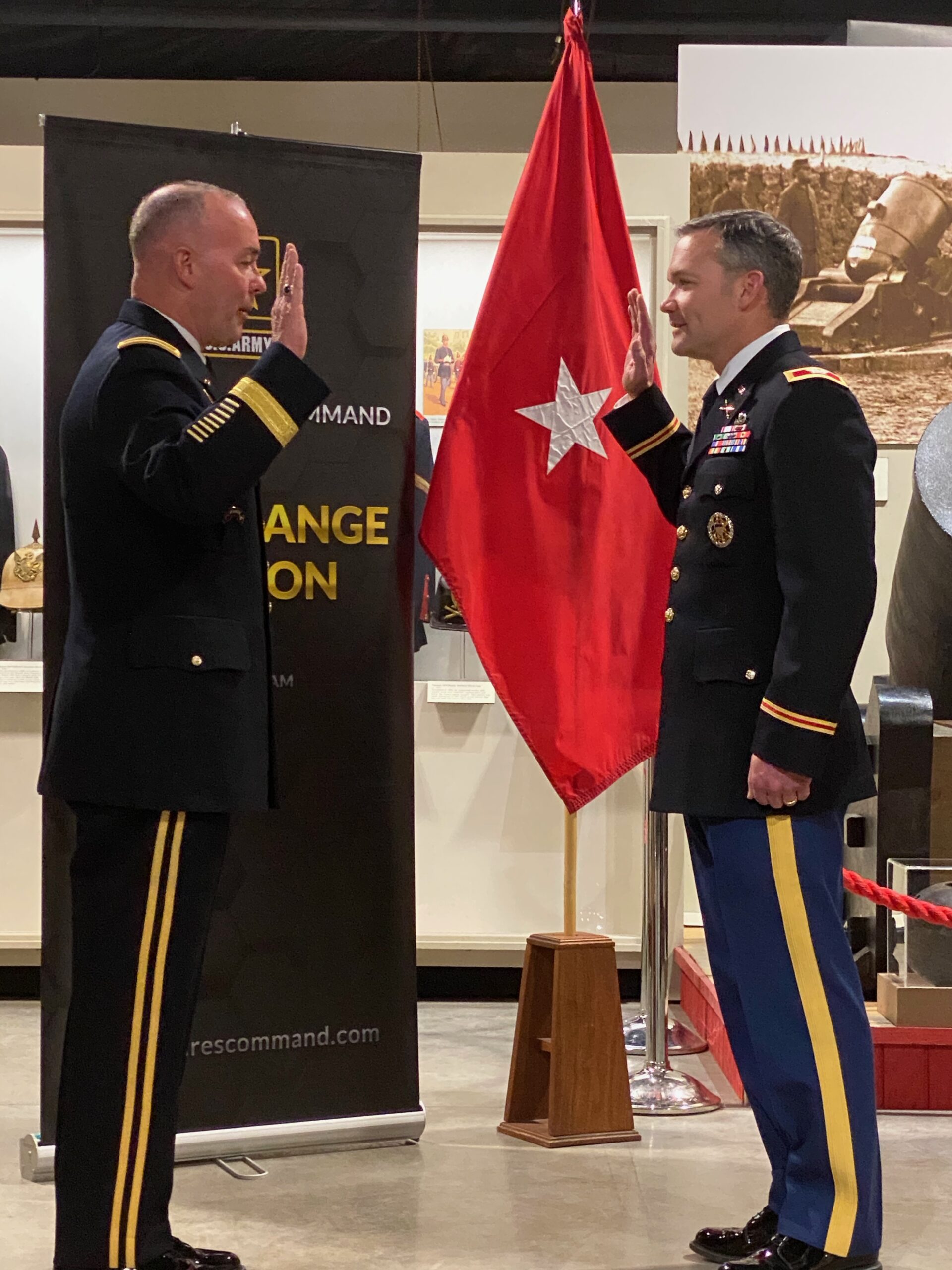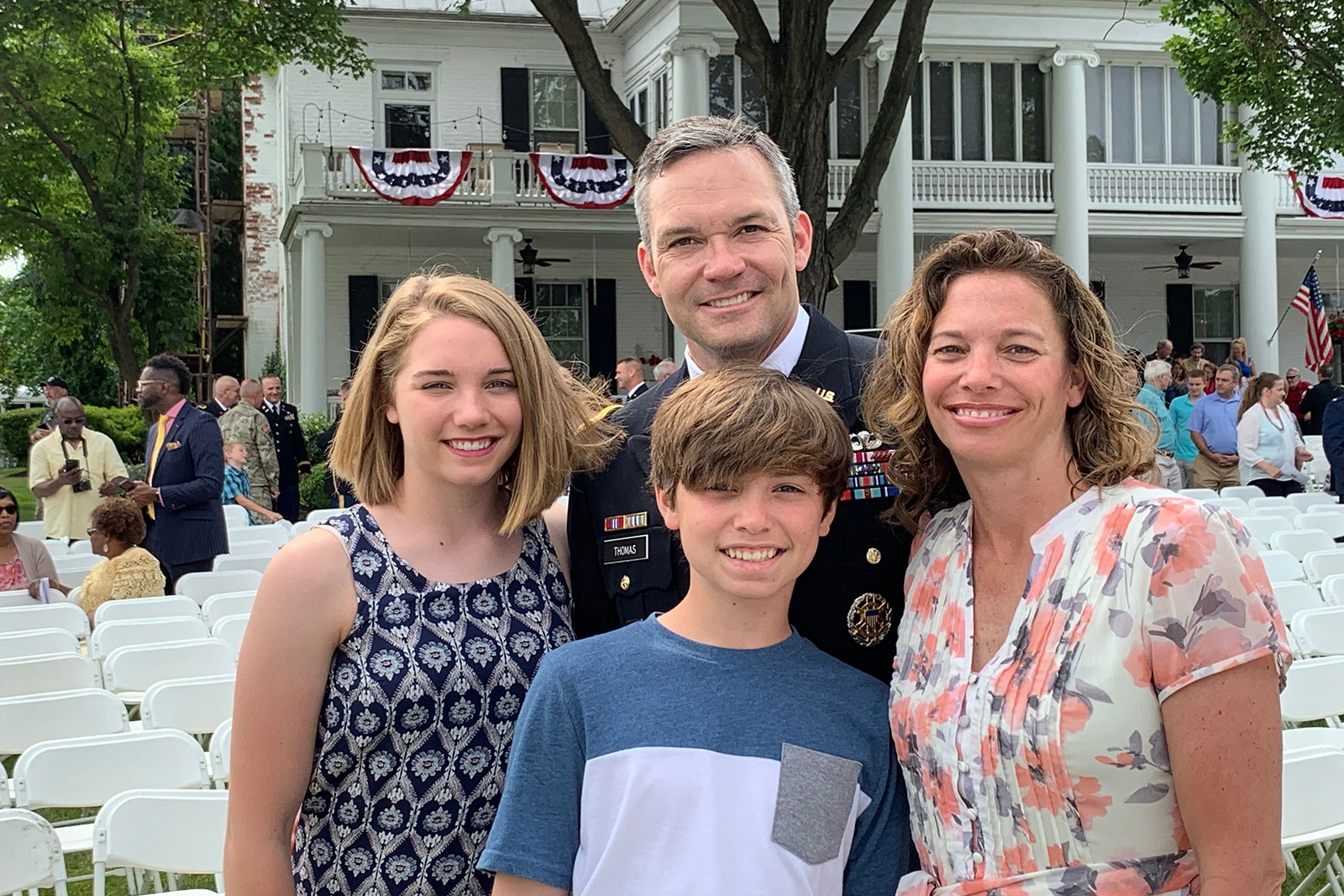Honor, courage and leadership are a few of the principles that Army Col. Doug Thomas lives by. He puts his family first, approaches life with a positive attitude, makes the tough calls and tries to have fun in the process.
These principles served him well during his expansive career in the U.S. Army, helping him achieve incredible success during his 21 years of service. He currently serves as the chief of operations for the Long Range Precision Fires Cross-Functional Team at Fort Sill, Oklahoma. He was awarded the Parachutist Badge and the coveted Wolf Belt Buckle. He speaks highly of his friends in the military and is thankful for each of the relationships he’s formed throughout his career. Thomas believes in simplicity, often preferring to avoid overcomplicated obstacles that might deter him from achieving success.
This is why when Thomas was diagnosed with epithelioid mesothelioma in May, at the age of just 45, he chose to return to the basic principles that guided him over the years. “That was a very eye-opening experience,” he shares. “What you thought was important five minutes earlier didn’t necessarily have the same importance.”
Thomas, an avid runner, began to notice some difficulty breathing during his daily runs in early May. At the time, he thought he had runner’s pneumonia. After being admitted to the ER and undergoing several tests, his results revealed multiple suspicious spots on his left lung. Further tests and scans were conducted that confirmed the spots were malignant. “I knew what malignancy meant,” he says. “I’m like WTF, right? No way, that’s not possible. I’m healthy, I run seven and a half miles a day.”
As Thomas struggled to process the news of his cancer diagnosis, his doctors ran more tests to determine whether it spread outside of his left lung. He was left to prepare for one of the most difficult conversations he’d have with his wife and children. He decided to call his mom first to give her the news.
“I said, ‘I have no idea how to approach this with Tiff, my wife, or my kids,’” he remembers. Thomas was grateful for his mother’s support throughout the process and reminisces fondly on how much he relied on her. “I didn’t know how to approach it with my mom, but you know, I think we can all relate to moms,” he shares. “They’re the ones we always lean back on.” Shortly after his conversation with his mom, Thomas told his wife and children about his diagnosis.
Before receiving his diagnosis, Thomas wasn’t familiar with mesothelioma. Apart from noticing the occasional television commercials advertising legal counsel for mesothelioma victims, he hadn’t spent much time thinking about it. Looking back on his experiences in the military, he wishes there was more of a conversation about the dangers of asbestos exposure and the risks associated with it. “The medical community I think needs to make sure that they have a good understanding of what the signs are for this disease, which could be helpful,” he says. “And then, you know, I think the military has to do something in terms of informing the veterans of the risks that are associated with asbestos exposure.”
That was a very eye-opening experience. What you thought was important five minutes earlier didn’t necessarily have the same importance.
Thomas chose to approach his battle with mesothelioma using the principles that guided him during his many years of service. He was aggressive and deliberate about his choices for medical care. After a few changes to his medical team, Thomas became a patient of Dr. R. Taylor Ripley, the director of the Mesothelioma Treatment Center at Baylor College of Medicine. Ripley recommended that Thomas undergo a lung-preservation surgery to remove the cancerous tumors from his lung without removing it altogether. By June, Thomas had the surgery. He was reunited with his wife and children during the recovery process.
Throughout his battle, he relied heavily on his support network, which kept him encouraged and uplifted. “As I approached this whole cancer thing, I knew that I needed to enlist people that were going to be great supporters and help me through this to make decisions and things like that,” he says.
Support for Thomas came in the form of family and friends messaging him, calling him, joining support groups on Facebook, and receiving spiritual counsel from one of his priests from childhood. Thomas also found support in his military friends. “I have a buddy that’s in the army now that’s had cancer three times,” he says. Thomas reached out to his friend and requested that he become his cancer coach, given his experiences with cancer.

As part of his commitment to keeping things simple, Thomas takes his journey one day at a time. Following his release from the hospital after surgery, he had to adjust to having four chest tubes and a reconstructed diaphragm. The colonel, who used to jog seven miles a day, was now adjusting to walking nearly three and a half miles instead. Each day, he remained committed to building his strength and accomplishing his goal for a full recovery.
Despite a small setback in July when his doctors confirmed he’d developed a minor infection and mild pneumonia, Thomas remained diligent and positive. His latest PET scans reveal no signs of cancer, and all of his chest tubes have been removed.
This month, Thomas will begin the next phase in his multimodal treatment plan, which includes radiation therapy. Since his initial diagnosis, Thomas has chosen to keep his family and friends informed about his journey using the popular messaging app, WhatsApp. Although the decision was intended to minimize the extra hassle of having redundant individual conversations, he now has access to a series of messages documenting his journey thus far.
Reflecting on some of the highs and lows of his experience, Thomas acknowledges the harsh reality of receiving a cancer diagnosis and trying to figure out what to do next.
I've always believed things happen for a reason, but as this happened, I think that really resonated much more.
“I think that it’s really a way for me to kind of reflect on what I’m thankful for, and what I have done to prepare myself for this journey,” he says. “I’ve always believed things happen for a reason, but as this happened, I think that really resonated much more.” Thomas chose to see his diagnosis as an opportunity rather than a setback, which provided him the clarity to keep moving forward despite the difficulties he faced.
Through his many years of service in the military, Thomas feels he was unexpectedly prepared for the battle he’s endured with mesothelioma. During his time as a battalion commander, the six principles that guided him were the same principles that guided him throughout this journey.
“Those six things are what I preached daily, and I used those to attack this problem,” he says. “Everything in my life, whether it’s in the military, has been something that I’ve gone after with those six tenants in mind. So, it’s prepared me in the best way possible.”
With these principles in mind, Thomas is grateful for what he’s learned so far, and he’s embracing what his next chapter has in store. “I’ve kind of decided that my Army career is over,” he admits. “The Army’s gonna continue to take care of me, but in terms of my ability to continue to serve, that’s going to be challenging.”
Thomas keeps a positive attitude as he reflects on all of the great memories he’s had during his career in the military, and the great relationships he’s made in the process. He vividly remembers the day he was commissioned into the Army. At that moment, he raised his right hand and swore to defend the United States’ constitution against all foreign or domestic enemies. Next to his recent promotion to the rank of colonel, the mark of an excellent career in military service, these two memories stand out the most for him. They signify the beginning and the end of an incredible journey, and the promise of what’s next.
Thomas encourages everyone facing adversity and those in particular who are facing a mesothelioma diagnosis to keep a positive attitude and remain courageous. For him, it’s all about execution, a sentiment best exemplified by his motto, “Execute violently.”







